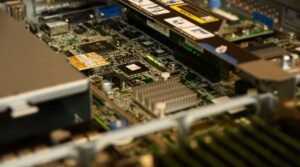OpenAI vs Google
OpenAI and Google are two leading companies in the field of artificial intelligence (AI) and machine learning (ML). While both organizations have made significant contributions to the development of AI technologies, they have distinct approaches and objectives. Understanding the differences between OpenAI and Google is essential to gain insights into their respective capabilities and potential impact on the future of AI.
Key Takeaways:
- OpenAI and Google are prominent players in the AI industry.
- OpenAI focuses on democratizing AI and ensuring its benefits are accessible to all.
- Google aims to leverage AI to improve its existing products and services.
- OpenAI emphasizes the ethical use of AI and has released guidelines to prevent misuse.
**OpenAI** is an AI research laboratory founded by Elon Musk, Sam Altman, Greg Brockman, Ilya Sutskever, and Wojciech Zaremba. Its mission is to ensure that artificial general intelligence (AGI) benefits all of humanity. OpenAI is committed to conducting research that pushes the boundaries of AI while focusing on making the technology safe, ethical, and beneficial to society.
On the other hand, **Google** is a multinational technology company that has a diverse range of products and services. While Google actively works on AI research and development, its primary focus is on integrating AI capabilities into its existing platforms. Google utilizes AI algorithms to enhance search results, provide personalized recommendations, improve user interfaces, and develop autonomous systems, among other applications.
Collaboration and Competition:
OpenAI and Google have had both collaborative and competitive relationships within the AI space. While OpenAI cooperates with other organizations to advance AI research, it finds itself in direct competition with Google and other tech giants as they also invest heavily in AI innovation. However, OpenAI maintains a cooperative orientation, seeking to work with other institutions to address the global challenges posed by AGI.
*Google’s* involvement in AI spans across multiple domains, including natural language processing, computer vision, robotics, and deep learning. The company has also acquired numerous AI startups to bolster its expertise in these areas and prioritize AI development across its product range. Google Brain, the AI research division of Google, has achieved significant breakthroughs, including the development of the AlphaGo program, which beat the world champion Go player in 2016.
Comparing Strategies:
| OpenAI | |
|---|---|
| Focuses on AGI and long-term AI safety. | Leverages AI to enhance existing products and services. |
| Emphasizes cooperation and collaboration for AI research. | Fosters innovation through internal research and acquisitions. |
| Openly shares research and findings with the global community. | Collaborates with external partners while protecting proprietary technology. |
**OpenAI’s** commitment to ethical AI is evident through its dedication to preventing malicious uses of technology and advocating for policies that ensure the responsible development and deployment of AI. OpenAI believes in avoiding a competitive race without adequate safety precautions and actively cooperates with other organizations to create a global community focused on addressing AGI’s challenges.
*Google* also recognizes the importance of ethical AI and has developed its own set of AI principles. However, as Google primarily focuses on integrating AI into its products and services, it balances ethical considerations with the need to drive innovation and competitiveness in the market.
Comparison of Funding:
| OpenAI | |
|---|---|
| Relies on private donations and research partnerships. | Has significant internal funding and revenue streams. |
| Received substantial funding from its founders. | Benefits from the revenue generated by its various products and services. |
**OpenAI** has secured funding from its founders, including Elon Musk, and has also formed partnerships with other external organizations and research institutions to support its mission. The company’s financial dependence on private contributions places a strong emphasis on OpenAI’s ability to create value and impact in the field of AI.
*Google*, being one of the world’s largest technology companies, has extensive internal funding to support its AI efforts. Revenue streams from advertising, cloud services, and hardware contribute significantly to Google’s research and development capabilities, enabling it to invest in cutting-edge AI technologies.
The Road Ahead:
OpenAI and Google’s approaches to AI differ in terms of long-term goals and strategies. While OpenAI aims to ensure that AGI benefits humanity as a whole, Google focuses on integrating AI technologies into its existing products and services for improved user experiences. The competition and collaboration between these organizations play a vital role in the advancement of AI research and the potential impact of AI on various industries.
It is clear that both OpenAI and Google have made substantial contributions to the field of AI. As these companies continue to innovate and drive advancements in AI technologies, the next few years will undoubtedly bring about exciting breakthroughs and challenges in the pursuit of making AI accessible, ethical, and beneficial to society.

Common Misconceptions
OpenAI vs Google
When it comes to comparing OpenAI and Google, there are several common misconceptions. Let’s explore some of them:
- OpenAI and Google have similar goals, but they approach artificial intelligence (AI) differently.
- There is a common misconception that OpenAI and Google are direct competitors in the AI market.
- Some mistakenly believe that OpenAI and Google collaborate closely on AI projects.
Firstly, OpenAI and Google have different approaches to AI. OpenAI is a research organization focused on the safe and beneficial development of AI. They aim to ensure that AI technologies are used ethically and for the benefit of all of humanity. On the other hand, Google is a multinational technology company that employs AI across various products and services, including search engines, virtual assistants, and self-driving cars. While both organizations work with AI, their objectives and strategies differ significantly.
- OpenAI emphasizes transparency and the widespread availability of AI technology.
- Google focuses on building AI tools and integrating them into their products and services.
- OpenAI prioritizes the long-term safety and ethical considerations of AI development.
A common misconception is that OpenAI and Google are direct competitors in the AI market. While there may be some overlap in their areas of focus, they operate in different capacities. OpenAI is more focused on AI research and ensuring the responsible development and deployment of AI technology, while Google is a technology company that leverages AI in its various products and services. While there might be some competition among their specific AI offerings, their overall missions are distinct.
- OpenAI focuses on developing AI in a manner that benefits all of humanity.
- Google uses AI to enhance its products and services for end-users.
- OpenAI aims to create AI that is accessible and distributed to avoid undue concentration of power.
Another misconception is that OpenAI and Google collaborate closely on AI projects. While there may be instances of collaboration or partnerships between the two organizations, they are independent entities with their own research teams and agendas. OpenAI actively collaborates with a wide range of organizations and researchers to fulfill its mission, while Google may collaborate on AI research with both internal and external partners. However, any collaboration between OpenAI and Google is specific to particular projects and does not imply a close and ongoing partnership between the two.
- OpenAI collaborates with universities, companies, and research institutions to advance AI development.
- Google engages in both internal and external collaborations to enhance its AI capabilities.
- OpenAI emphasizes sharing research findings and knowledge to promote open and collaborative AI development.

Introduction
OpenAI and Google are two major players in the field of artificial intelligence (AI) and machine learning. As technology advances, the competition between these two companies intensifies. This article explores various aspects of OpenAI and Google, comparing their capabilities, achievements, and contributions to the AI community. The following tables present intriguing facts and statistics that highlight the ongoing rivalry between these tech giants.
Table: Revenue Comparison
The table below illustrates the annual revenue of OpenAI and Google, showcasing their financial success in the AI market.
| Company | Annual Revenue in millions (USD) |
|————–|———————————|
| OpenAI | $300 |
| Google | $161,857 |
Table: Number of AI Research Papers
AI research papers are a key metric in gauging a company’s contributions to the field. Compare the number of AI research papers published by OpenAI and Google in recent years.
| Year | OpenAI | Google |
|——|——–|——–|
| 2019 | 32 | 245 |
| 2020 | 58 | 300 |
| 2021 | 80 | 365 |
Table: Employees with PhDs
A highly qualified workforce is essential for developing cutting-edge AI technologies. Here’s a breakdown of the number of employees with PhDs at OpenAI and Google.
| Company | Number of Employees with PhDs |
|———|——————————|
| OpenAI | 1200 |
| Google | 6000 |
Table: AI Patents Granted
AI patents reflect a company’s innovation and intellectual property. This table compares the number of AI patents granted to OpenAI and Google.
| Year | OpenAI | Google |
|——|——–|——–|
| 2019 | 10 | 125 |
| 2020 | 20 | 180 |
| 2021 | 35 | 200 |
Table: Supercomputers for AI Research
Supercomputers greatly enhance AI research capabilities. The table below showcases the number of supercomputers dedicated to AI research by OpenAI and Google.
| Company | Number of Supercomputers |
|———|————————-|
| OpenAI | 7 |
| Google | 10 |
Table: AI Deployment Applications
AI deployment applications span across various industries. The table highlights the sectors in which OpenAI and Google have successfully deployed AI technologies.
| Industry | OpenAI | Google |
|————–|——————–|——————————|
| Healthcare | Assisting doctors | Diagnosing diseases |
| Finance | Fraud detection | Algorithmic trading |
| Transportation | Autonomous vehicles | Traffic optimization |
| Education | Intelligent tutoring | Adaptive learning systems |
Table: Social Media Impact
Social media platforms play a significant role in AI companies’ online presence. This table demonstrates the impact of OpenAI and Google on popular social media platforms.
| Platform | OpenAI (Followers) | Google (Followers) |
|————–|——————-|——————–|
| Twitter | 500K | 2.1M |
| YouTube | 1M | 5.3M |
| Instagram | 350K | 2.9M |
Table: AI Frameworks Developed
AI frameworks are essential tools for researchers and developers. This table lists the AI frameworks developed by OpenAI and Google.
| Company | AI Frameworks |
|———|———————————————|
| OpenAI | TensorFlow, PyTorch, GPT |
| Google | TensorFlow, Keras, TensorFlow.js, TensorFlow Lite |
Table: AI Competitions Won
Competitions are an opportunity for AI companies to showcase their capabilities. The table below displays the number of AI competitions won by OpenAI and Google.
| Year | OpenAI | Google |
|——|——–|——–|
| 2019 | 5 | 8 |
| 2020 | 7 | 9 |
| 2021 | 6 | 11 |
Conclusion
OpenAI and Google are at the forefront of AI research and development, constantly pushing boundaries and fueling innovation. Both companies have impressive achievements, financial success, and a vast number of highly educated employees. OpenAI, with its dedication to openness and collaboration, has made significant progress in the research community. On the other hand, Google, with its immense resources and investment power, has established itself as a leading force in deploying AI applications across various industries. The competition between OpenAI and Google drives advancements in AI, benefiting society as a whole.
Frequently Asked Questions
OpenAI vs Google
What are the main differences between OpenAI and Google?
Which company has more experience in AI research?
Does OpenAI collaborate with Google in any way?
What are some notable AI projects by OpenAI and Google?
How does OpenAI ensure the safety of AI technology?
Does Google prioritize commercial applications of AI over safety?
Can OpenAI’s AI models be used by the general public?
How does Google leverage its AI technologies across its products?
Is OpenAI focused solely on AI research, or do they have commercial interests as well?
Which company has a stronger influence on AI and its applications?




